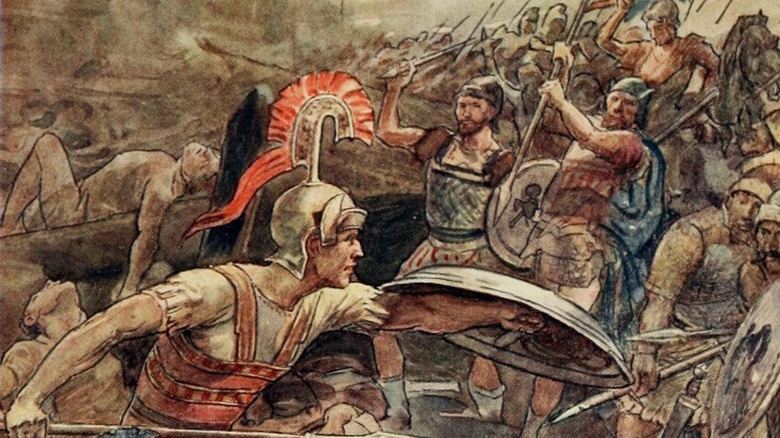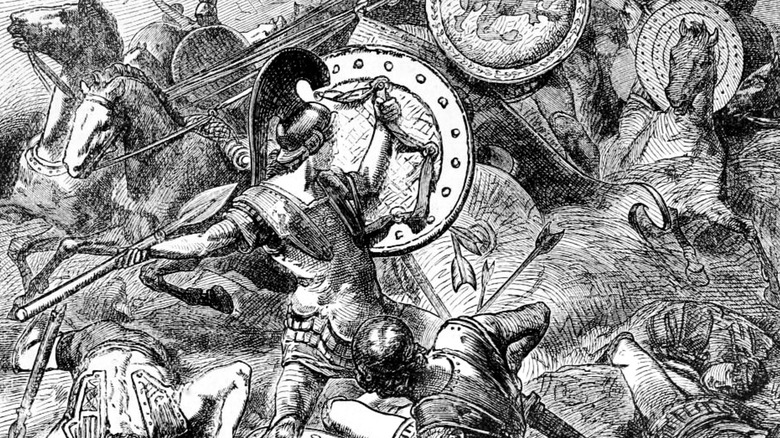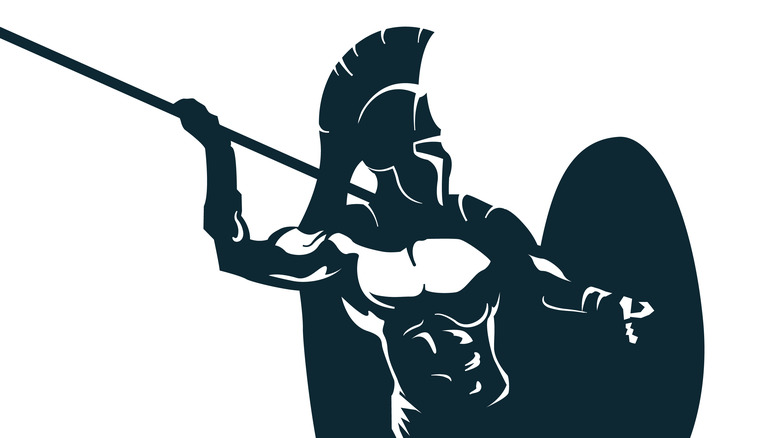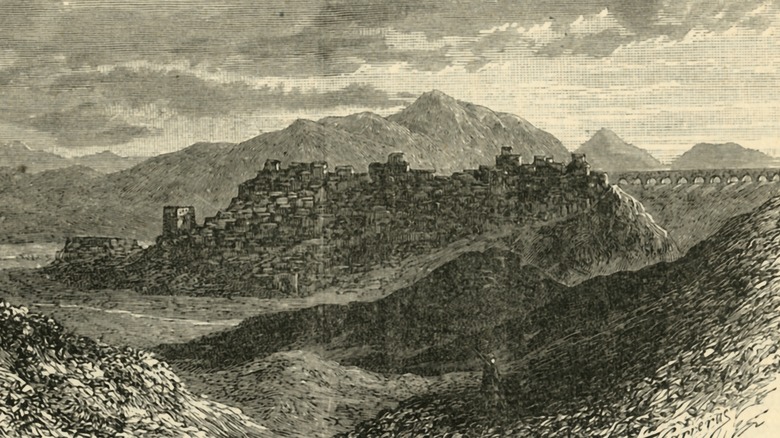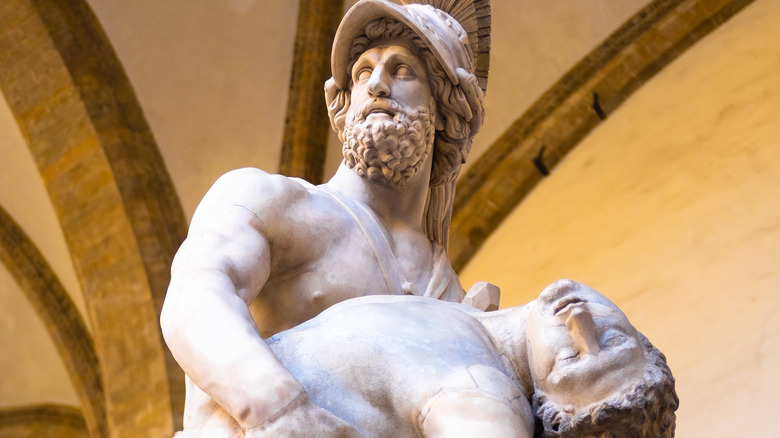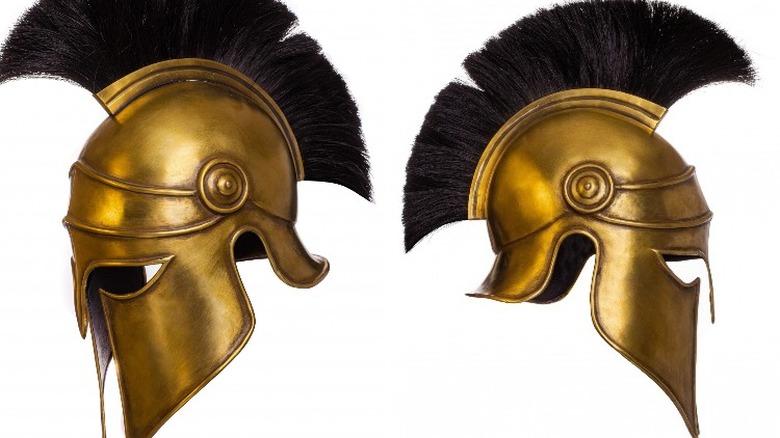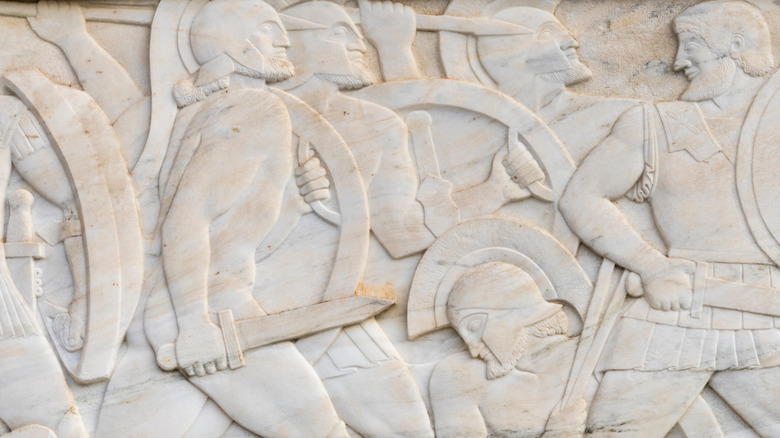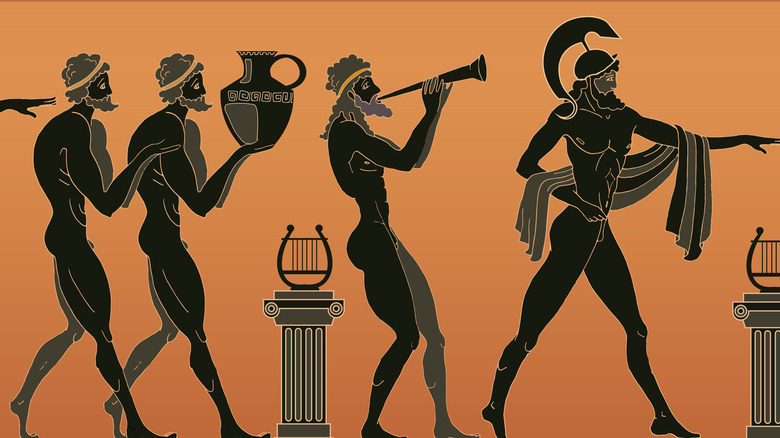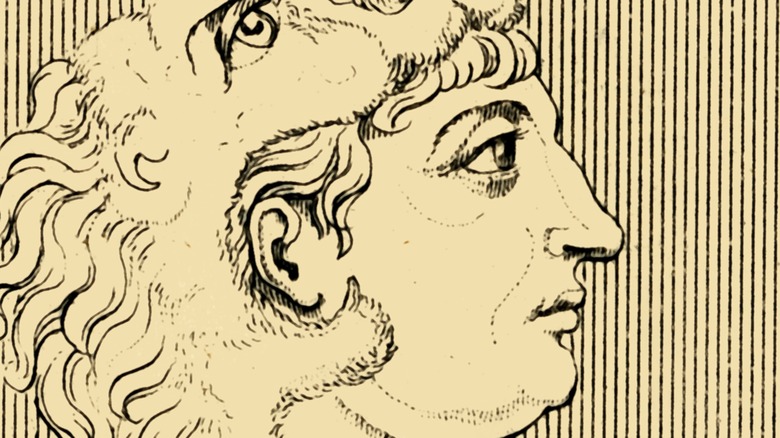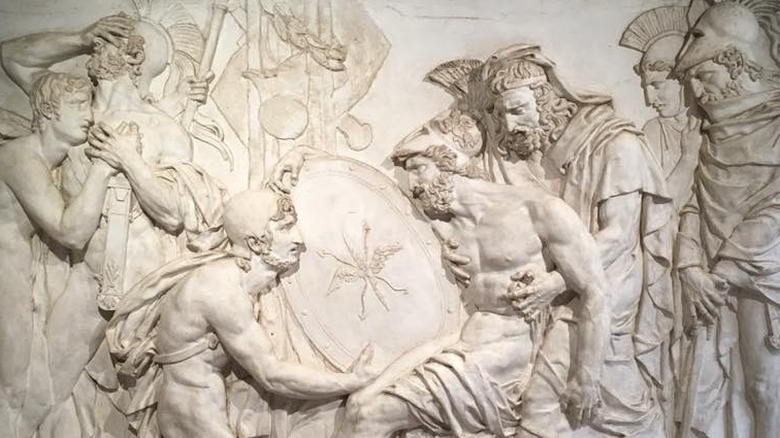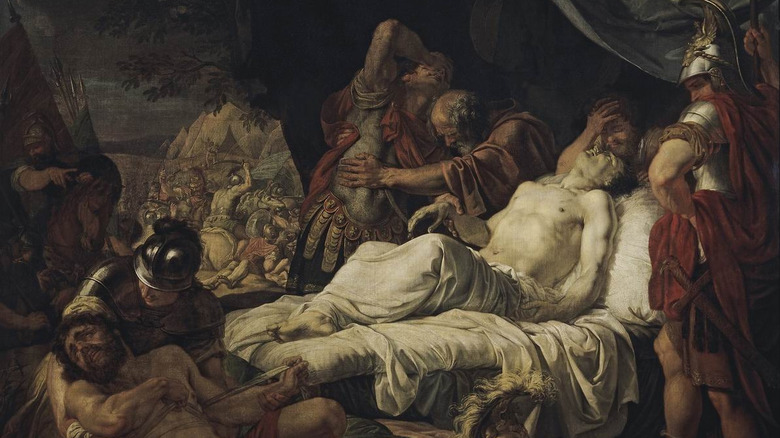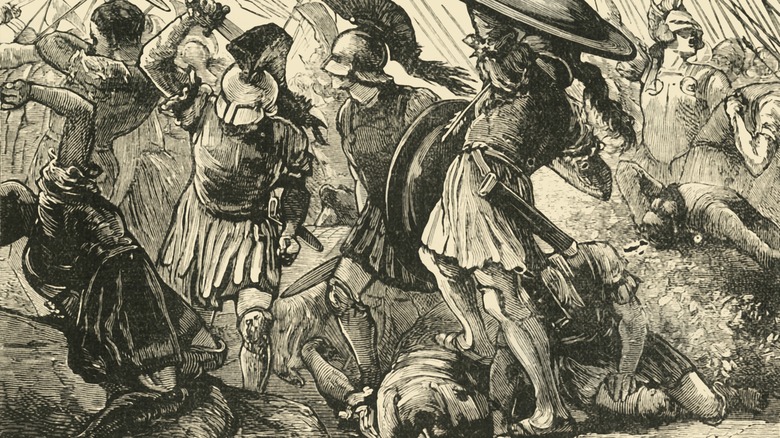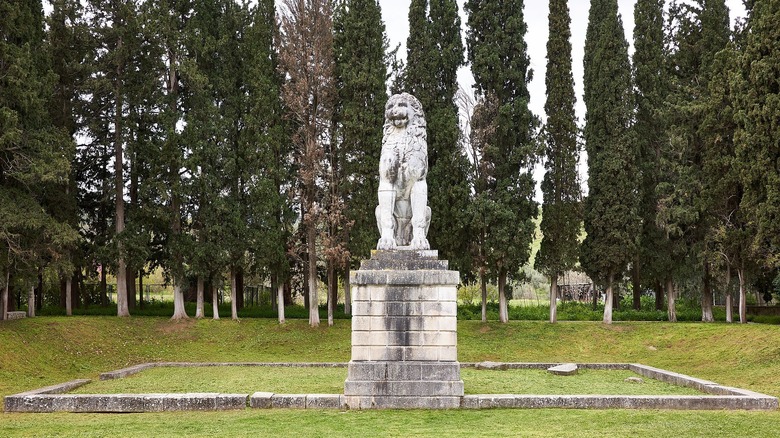The Sacred Band Of Thebes: The Elite Unit Of Soldiers That Took Down Sparta
The Sacred Band was an elite fighting force that changed the course of the ancient world. Although they were the most imposing army of the age, the entire troop of soldiers was only made up of 300 men. As described by the National Endowment for the Humanities, the Sacred Band was a powerful standing army for the city-state of Thebes, and the only military force to truly challenge Sparta's domination of Ancient Greece. Fascinatingly, the soldiers were chosen not only for their extreme fighting skills, but also for their sexuality. It is believed that the Sacred Band was entirely composed of 150 gay male couples. This army of 300 lovers transformed Thebes into one of the most powerful and influential city-states in Ancient Greece.
As described by the World History Encyclopedia, the Sacred Band first fought in the Boeotian War in 378 B.C. They would remain undefeated in battle for 40 years until they were obliterated all at once at the Battle of Leuctra in 338 B.C. As noted by History, their defeat is often described as the end of the classical period. The Sacred Band had shaped the ancient world, and their deaths marked the end of an age.
It was the first of its kind
Ancient Greece was made up of a number of city-states that were sometimes at war with one another. As described by National Geographic, there were actually more than 1,000 different independent city-states, but some of the most powerful of these included Athens, Corinth, Sparta, and Thebes. As noted by the National Endowment for the Humanities, most city-states had their own armies made up of volunteer part-time soldiers. Soon, however, there would be a new kind of army in Ancient Greece.
As noted by Britannica, some city-states located in east-central Greece were a part of an allegiance known as the Boeotian League, which was led by Thebes. The Boeotian League found itself under attack from the region's greatest military power: Sparta. In order to defend themselves, Thebes created the first Ancient Greek troop of full-time professional soldiers. This elite fighting force would be called the Sacred Band.
The elite force was created to defeat Sparta
The different Ancient Greek city-states had different cultures. For instance, Athens was known for prioritizing the arts, while Sparta's focus was the military. As described by History, young Spartan boys were trained to be soldiers from the age of 7. Teenage boys were often used as a police force within Sparta, and adult men from the ages of 20 to 60 years old were in the army. As described by the National Endowment for the Humanities, in 404 B.C., the Spartans defeated Athens in the Peloponnesian War. For a time, Thebes was under the control of Sparta. The Thebans were able to push the Spartans back out of their city-state, but it was clear that the war between Sparta and Thebes was not over. If Thebes was going to have a chance against the greatest military in ancient Greece, they would need elite soldiers of their own.
A Theban military commander named Gorgidas put together a new fighting force: the Sacred Band of Thebes. As described by History, Gorgidas personally selected all 300 warriors. Partially, they were selected for their skill as soldiers, but there was something else that Gorgidas was looking for — he wanted the men to be lovers.
The Sacred Band had two famous commanders
Gorgidas was responsible for selecting the members of the Sacred Band and served as their first leader, but the majority of their most important victories were won under the command of two other men: Epaminondas and Pelopidas.
Pelopidas, who would become a highly successful leader of the Sacred Band, had previously been a political leader in Thebes. As described by Britannica, he was forced into exile when Sparta invaded and took control of the city-state and set up a dictatorship. That didn't stop him from launching a coup and returning to take Thebes back. Another Theban leader named Epaminondas had managed to avoid being exiled, but when Pelopidas returned to the city to fight the Spartans, Epaminondas led the uprising to reclaim Thebes. As described by the National Endowment for the Humanities, Epamindondas was the general who figured out how to best utilize the Sacred Band, while Pelopidas went on to lead the elite fighting force in battle.
Epaminondas and Pelopidas have been described as extremely close, and according to legend, Epaminondas once saved Pelopidas's life in battle.
It was believed that soldiers fought harder if they were lovers
Many Ancient Greek heroes were depicted as having male lovers, including Achilles, the hero of "The Iliad." As described by the National Endowment for the Humanities, in Plato's "Symposium," it's suggested that an army of men who were lovers would be the most powerful military force possible because the soldiers would fight harder to protect their partner and be embarrassed by the idea of running away from a battle in front of their lover. Whether this idea was realistic or not, the people of Thebes believed it, and the sexual and romantic lives of the men in the Sacred Band were considered a major advantage.
It's unknown exactly what year "Symposium" was written and whether or not the Sacred Band already existed. It's possible that when "Symposium" was written, the Sacred Band had already proved itself to be a powerful force, and that was whom Plato was referring to. It is also possible that Gorgidas was inspired by what Plato had written to select 150 pairs of lovers to protect Thebes.
Thebans had a different perspective on sexuality
The following slide includes references to child abuse.
The laws about sexual and romantic relationships were different from city-state to city-state, but Thebes was known for considering relationships between males more acceptable than most. As described by The Daily Beast, this was controversial in ancient Greek society. In "Symposium," Plato promotes the idea of an army of lovers, but also implies that the men of Thebes were so bad at flirting with women that they had to make homosexuality legal.
Not all sexual relationships in the ancient Greek world match up with a modern idea of what a romantic relationship is or should be. As described by Professor Paul Cartledge of the University of Cambridge (quoted via History Extra), there was a practice of adult men having sexual relationships with younger ones, including teenage boys. It was common for the older man to be seen as a mentor who helped to educate and protect the younger. In the modern world, these dynamics would certainly be considered child abuse.
In the rival city-state Sparta, it is believed that sexual relationships between adolescents and adults were common, but men did not become fully-fledged soldiers before the age of 20 (per History). It's unknown for certain how old the soldiers of the Sacred Band were, but as noted by History, Gorgidas is believed to have chosen each fighter himself on the basis of their military merit and experience, so it is likely that they were already fully-fledged soldiers.
If you or someone you know may be the victim of child abuse, please contact the Childhelp National Child Abuse Hotline at 1-800-4-A-Child (1-800-422-4453) or contact their live chat services.
The men swore vows to each other
It was believed that the men fighting in the Sacred Band would fight better if they were committed to one another. As noted by History, it is possible that the 300 soldiers in the Sacred Band were chosen partially because they were gay and possibly already in romantic relationships with other soldiers. Regardless of whether or not these men were already romantically involved before the formation of the Sacred Band, it is believed that the elite fighting force was made up of 150 couples. To ensure that these men were committed, they were encouraged to swear vows to each other.
As described by the National Endowment for the Humanities, it was the bond between the men that made the army "sacred." Vows between male lovers were made at the Shrine of Iolaus. As stated by Britannica, Iolaus was a hero from Greek mythology who was sometimes depicted as a lover of Hercules.
They defeated a much more imposing force
Initially, Gorgidas utilized the Sacred Band by splitting them up and interspersing them throughout the Theban army, hoping to inspire the other men to fight harder. As noted by the World History Encyclopedia, Gorgidas was likely killed before the Battle of Tegyra. Pelopidas assumed command of the Sacred Band and immediately adopted a new strategy — they would fight together as a unit.
The Sacred Band and the rest of the Theban army met the Spartan military in open combat. The new commander — Pelopidas — had the Sacred Band as the vanguard, out in front of the rest of the army. As explained by Slawomir Sprawski's "Battle of Tegyra (375 BC)," the Thebans were vastly outnumbered by the Spartans, who were considered the most powerful military force in the world.
It is believed that there were little more than 500 Thebans, and there may have been more than twice as many Spartans. The Thebans were able to defeat the Spartans, which was unprecedented and became a major turning point in the conflict between the two city-states. Typically, Sparta's military was better trained and more experienced than any other military they faced, but the Sacred Band being placed right at the front of the battle evened the odds.
This was the first time the Spartan military had been defeated by a smaller army, and the Sacred Band established itself as one of the most powerful military forces in the ancient world.
They triumphed over Sparta
At the Battle of Tegyra, the Sacred Band had helped to establish Thebes as a military power — and probably the only army with a chance against Sparta. As noted by the World History Encyclopedia, Spartan and Theban leaders met to discuss terms of peace between their two city-states. The peace talks failed, and General Epaminondas refused the Spartan terms. Another battle was coming.
The Spartan and Theban military — including the Sacred Band — met by a village called Leuctra, the name by which the battle would come to be known. As described by the National Endowment for the Humanities, the Theban military was again outnumbered, and it seemed highly likely that they would lose the battle. But General Epaminondas employed an unlikely strategy: the Sacred Band would be their secret weapon.
As detailed by Britannica, the way that Epaminondas decided to position his troops was unprecedented. Under the command of Pelopidas, the Sacred Band attacked the strongest Spartan forces head-on. They were able to wound the Spartan general, causing chaos in the ranks. The Spartan military scattered, and thanks to the Sacred Band, Thebes was victorious.
The battle changed the ancient world
After defeating Sparta with their standing army, the Sacred Band, Thebes became one of the most powerful and influential forces in ancient Greece. The battle at Leuctra was a major victory for Thebes, but it was an even greater loss for Sparta. For the first time, the ancient world saw that it was possible to stand up to the might of Sparta's military, even with smaller numbers. As described by the National Endowment for the Humanities, the battle at Leuctra had far-reaching implications for the future of ancient Greece.
Sparta had been the most imposing military power in ancient Greece, but after their defeat to the Sacred Band and the rest of the Theban military, they began to lose control. City-states that had previously been under Spartan rule began to rebel. General Epaminondas himself helped to build up the military strength of two cities neighboring Sparta in order to check its power. Even after Thebes was no longer the dominant military power, Sparta's influence had been permanently damaged. Their military was at one time considered undefeatable, and once that was proven false, Sparta would never again be the most powerful city-state in ancient Greece.
The Sacred Band's commanders inspired the person who would destroy them
The Sacred Band helped Thebes to become the greatest military power in ancient Greece for about a decade. Their role in ancient Greek society had become very important, and they were sometimes asked to intervene in conflicts between other city-states. As described in "The Age of Alexander: Nine Greek Lives," the Sacred Band's commander, Pelopidas, was asked to arbitrate a conflict that involved the kingdom of Macedonia. As stated by Purdue University, one of the terms of the resolution that Pelopidas decided on was that a teenage Macedonian prince named Philip was sent to Thebes as a hostage.
As noted by N.G.L. Hammond, Philip is believed to have learned a lot about Thebes, particularly its military. While being forced to remain in Thebes in the care of the Theban generals, he studied the tactics of the Sacred Band's commanders, Epaminondas and Pelopidas. After two or three years, Epaminondas wanted to trade for Macedonian timber, and it is believed that Thebes released many Macedonian hostages, including the prince. Philip, who would have been around 17 years old, returned to Macedonia. While he had been away, his brother had been killed, and his heir was only an infant. Philip ruled the kingdom as regent, and one of the first things he did was restructure the Macedonian military based on the strategies he had learned in Thebes. This would prove devastating for the Sacred Band.
Their general was killed fighting the Spartans
The Sacred Band helped to make Thebes the dominant military power in ancient Greece for about a decade, but it wouldn't last. The deaths of their general, the famous Epaminondas, and their commander, Pelopidas, dealt the Sacred Band and the entire Theban military a devastating blow.
As described in "The Age of Alexander: Nine Greek Lives," Epaminondas led the Theban army against the Spartan military once again, this time near the city of Mantinea. Epaminondas successfully broke through the Spartan military rank and forced them into a chaotic retreat. Epaminondas and his army followed them. One legend, recounted by "Military Theory and Practice in the Age of Xenophon," states that Epaminondas saved his friend Pelopidas during the battle. During the fighting, Epaminondas was killed by a Spartan soldier named Anticrates. The two groups took oaths of peace after the battle at Mantinea, and as described by Britannica, Thebes had come out victorious. However, without Epaminondas, the Theban army was permanently weakened, and Thebes would never again be the most powerful city-state in Ancient Greece.
Their commander was killed in battle
Whether or not Epaminondas saved Pelopidas's life at Mantinea, it is known that he had previously rescued the commander after he was captured by Alexander of Pherae, a tyrant who ruled over the city-state of Thessaly. As described in "The Age of Alexander: Nine Greek Lives," Pelopidas survived this imprisonment thanks to Epaminondas, but Alexander of Pherae would ultimately be responsible for his death anyway.
It is believed that Pelopidas responded to a petition from the people of Thessaly to remove Alexander of Pherae from power. Initially, it seemed as though Alexander of Pherae's force had the advantage, as they were able to take the high ground. In response, Pelopidas changed tactics and actually took to the field himself. The historian Plutarch claimed that when Pelopidas spotted Alexander across the battlefield, he was so full of rage that he charged at the despot, leaving his own army behind. Alexander fled, and Pelopidas was stabbed with javelins.
The Sacred Band and the entire Theban army had thrived under the command of Pelopidas. Soon after his death, the Sacred Band would be destroyed.
They were ultimately defeated by Philip of Macedon and Alexander the Great
Philip of Macedon had been just a teenager when he was a hostage in Thebes. By 338 B.C., Philip had a teenage son of his own, and together they were leading a massive army through Greece, conquering everything in their path. As described by Britannica, Thebes had initially supported Macedon's rise, but when Athens was threatened, Thebes was convinced to intervene.
The Theban Army and the Athenian army met the Macedonian army at the Chaeronea. As noted by History Hit, the Sacred Band was the most intimidating force in the Ancient Greek world. Without defeating them, it would not be possible for Philip of Macedon to win at Chaeronea. The task of destroying the Sacred Band was assigned to Philip's teenage son, Alexander. He would one day be known as the conqueror Alexander the Great.
As detailed by Britannica, there are different theories about exactly what strategy Alexander used to defeat the Sacred Band, but it is believed that it was ultimately the elite fighting force's refusal to surrender that destroyed them. The Sacred Band had been trained to never retreat and never give up the fight. Alexander's army surrounded the Sacred Band, and they were all killed.
They were buried together
For 10 years, the Sacred Band had made Thebes the most powerful force in the ancient world. At Chaeronea, the entire elite fighting force was wiped out. There is no way of knowing for certain how Philip of Macedon felt about his army defeating the Theban forces that had inspired his military strategy. But there is a legend (recounted by the Hellenic Museum) that the victorious Philip visited the corpses of the Sacred Band, still lying on the battlefield, and was so overcome with the bravery and loyalty of the men as they faced certain death that he wept.
In the year 1880, a mass grave was discovered at Chaeronea, containing 254 skeletons (via History). As described by The New Yorker, the remains show that these men had wounds and were almost certainly killed in battle. Many were buried arm in arm or holding hands with each other. It is believed that these are the bodies of the men of the Sacred Band, still together in death.
